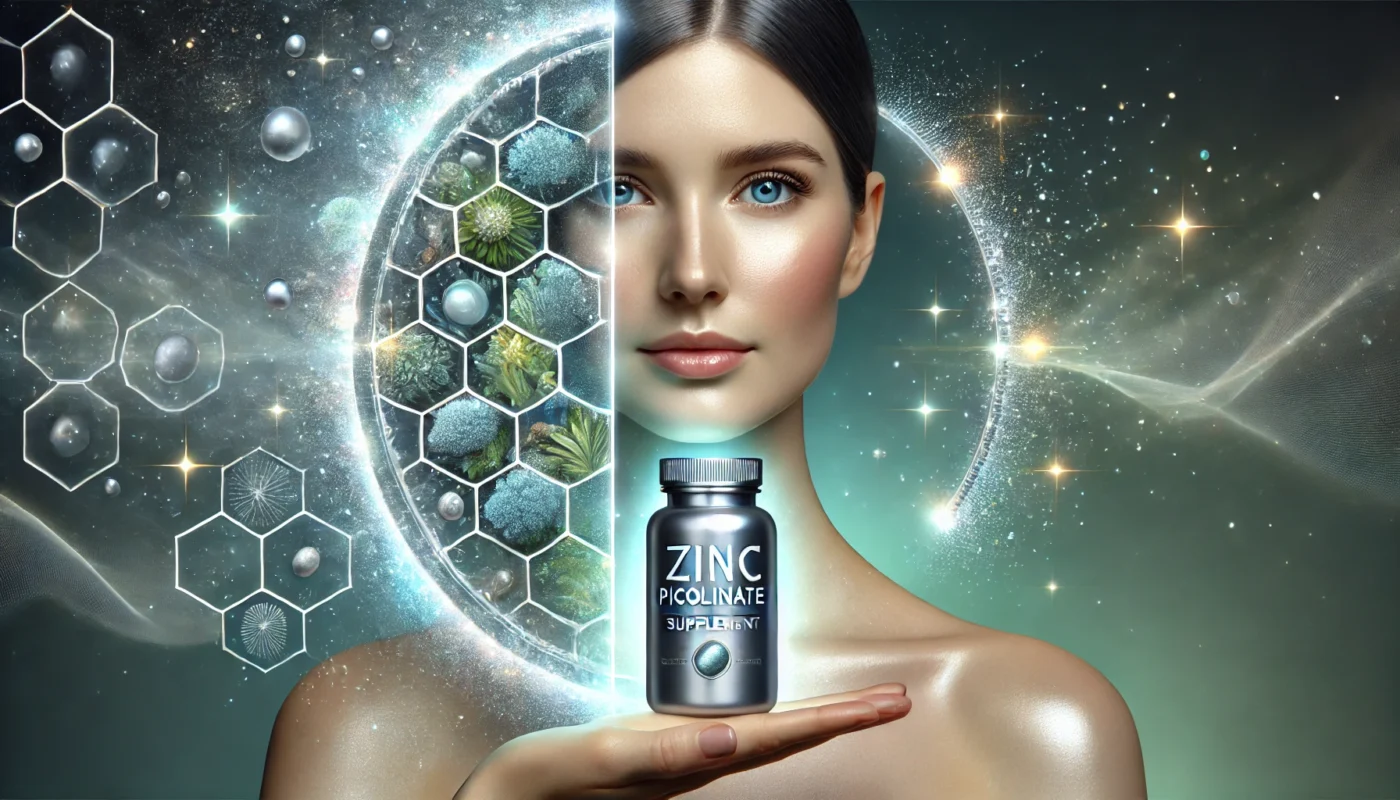The skin, our largest organ, serves as the body’s first line of defense against environmental aggressors, harmful microorganisms, and water loss. At the core of its protective abilities lies the skin barrier, a complex structure that maintains hydration and prevents external damage. However, factors such as pollution, aging, stress, and poor nutrition can weaken this barrier, leading to dryness, irritation, and increased susceptibility to infections.
One essential nutrient for maintaining and repairing the skin barrier is zinc. Zinc picolinate, a highly bioavailable form of zinc, has gained recognition for its ability to enhance skin health by strengthening the skin barrier and preventing moisture loss. This article delves into the science behind zinc picolinate’s role in supporting the skin barrier and its broader implications for skincare.
You May Also Like:
Can Zinc Picolinate Reduce Wrinkles? Here’s What to Know
Managing Rosacea Symptoms with Zinc Picolinate: What You Need to Know
Zinc Picolinate and Skin Barrier Function: The Science You Need to Know is an original (HSLHealing) article.
Understanding the Skin Barrier
The skin barrier, also known as the stratum corneum, consists of layers of tightly packed skin cells held together by lipid structures. It serves several vital functions:
- Moisture Retention: Prevents transepidermal water loss (TEWL), maintaining hydration.
- Protection: Acts as a shield against pathogens, allergens, and environmental damage.
- Repair: Facilitates healing and regeneration of the skin following injury or irritation.
When the skin barrier is compromised, symptoms such as dryness, redness, itching, and inflammation arise, often leading to chronic skin conditions like eczema or psoriasis.

Why Zinc Is Essential for Skin Barrier Function
Zinc plays a crucial role in maintaining and repairing the skin barrier through its involvement in various biological processes:
- Regulation of Keratinocyte Function:
Keratinocytes are the primary cells in the epidermis that produce keratin, a protein essential for the skin’s strength and structure. Zinc regulates their proliferation and differentiation, ensuring a healthy epidermal layer. - Support for Lipid Production:
Lipids, including ceramides, are vital for sealing the spaces between skin cells, and preventing moisture loss. Zinc promotes lipid synthesis and helps maintain skin hydration. - Wound Healing and Repair:
Zinc accelerates the skin’s ability to heal from wounds and microtears by promoting collagen synthesis and tissue regeneration. - Anti-Inflammatory Properties:
Zinc modulates inflammatory pathways, reducing irritation and supporting the healing of damaged skin. - Antimicrobial Effects:
Zinc protects the skin from bacterial and fungal infections, which can occur when the barrier is compromised.
What Is Zinc Picolinate?
Zinc picolinate is a chelated form of zinc, where zinc is bound to picolinic acid. This form enhances zinc absorption and bioavailability, ensuring that the mineral is efficiently delivered to the skin and other tissues. Compared to other forms such as zinc oxide or zinc sulfate, zinc picolinate is better absorbed, making it a preferred choice for supplementation aimed at improving skin health.

How Zinc Picolinate Enhances Skin Barrier Function
1. Reducing Transepidermal Water Loss (TEWL)
TEWL occurs when water evaporates from the skin, leading to dryness and dehydration. Zinc picolinate strengthens the lipid matrix, reducing water loss and maintaining skin hydration.
- Study Insight: A clinical study in Skin Pharmacology and Physiology found that zinc supplementation improved skin hydration by reducing TEWL in participants with dry skin.
2. Promoting Lipid Production
Lipids form the “mortar” that holds skin cells together, creating a strong barrier. Zinc picolinate enhances the synthesis of ceramides and other lipids, improving the skin’s ability to retain moisture.
- Research Finding: A study published in Journal of Dermatological Science showed that zinc supplementation increased ceramide levels in the skin, enhancing barrier function in individuals with eczema.
3. Accelerating Wound Healing
Zinc picolinate supports faster repair of the skin barrier by promoting collagen synthesis and tissue regeneration. This is particularly beneficial for individuals with sensitive or damaged skin.
- Clinical Evidence: A randomized controlled trial in Advances in Wound Care demonstrated that zinc supplementation reduced healing time for wounds and microtears, improving skin resilience.
4. Modulating Inflammatory Pathways
Inflammation weakens the skin barrier and exacerbates conditions like eczema and psoriasis. Zinc picolinate reduces pro-inflammatory cytokines, calming irritated skin.
- Evidence: A study in International Journal of Dermatology found that zinc supplementation reduced redness and irritation in individuals with atopic dermatitis.
5. Supporting Antimicrobial Defense
Zinc picolinate’s antimicrobial properties help prevent infections, especially when the skin barrier is compromised.
- Study Finding: Research in Dermatologic Therapy found that zinc supplementation reduced bacterial colonization on the skin, reducing the severity of acne and other infections.

Zinc Deficiency and Skin Health
Zinc deficiency is associated with various skin issues, including impaired barrier function, increased TEWL, and slower wound healing. Common symptoms include:
- Dry, flaky skin
- Persistent irritation or redness
- Delayed healing of cuts or wounds
- Increased susceptibility to infections
Statistics:
- A study in Clinical Nutrition found that up to 20% of individuals with chronic skin conditions had zinc levels below the recommended range.
- Research in Journal of Dermatology reported that zinc-deficient individuals experienced a 30% increase in TEWL compared to those with sufficient zinc levels.

Dietary Sources of Zinc for Skin Health
While zinc picolinate supplementation is effective, incorporating zinc-rich foods into your diet can also support skin health. Examples include:
- Animal-Based Sources: Oysters, beef, chicken, turkey, eggs.
- Plant-Based Sources: Pumpkin seeds, lentils, chickpeas, quinoa.
For individuals with dietary restrictions or increased zinc needs, zinc picolinate provides a reliable and convenient alternative.
Recommended Dosage and Safety
The recommended dietary allowance (RDA) for zinc is:
- Adult men: 11 mg/day
- Adult women: 8 mg/day
For improving skin barrier function, therapeutic doses of zinc picolinate between 15–30 mg/day are often recommended. However, excessive zinc intake (above 40 mg/day) can cause:
- Nausea
- Reduced copper absorption
- Gastrointestinal discomfort
Note: Always consult with a healthcare provider before starting supplementation to ensure proper dosage and safety.
Incorporating Zinc Picolinate into Your Skincare Routine
- Pair with Other Skin-Enhancing Nutrients: Combine zinc picolinate with antioxidants such as vitamin C or vitamin E for enhanced skin barrier repair.
- Adopt a Holistic Approach: Complement supplementation with a balanced diet, hydration, and topical skincare products that support the skin barrier.
- Monitor Skin Health: Track improvements in hydration, texture, and sensitivity to assess the effectiveness of zinc picolinate.

Future Research Directions
While substantial evidence supports zinc picolinate’s role in skin barrier health, further studies could explore:
- Long-term effects of zinc supplementation on chronic skin conditions.
- Synergistic effects of zinc with other nutrients, such as hyaluronic acid or omega-3 fatty acids.
- Zinc’s role in managing skin aging and preventing barrier decline.
Conclusion: Zinc Picolinate for Skin Barrier Function
Zinc picolinate is a scientifically backed supplement that addresses the root causes of weakened skin barriers. By reducing TEWL, enhancing lipid production, accelerating wound healing, and modulating inflammation, zinc picolinate strengthens the skin’s natural defenses and promotes hydration. For individuals looking to improve their skin’s resilience and overall health, incorporating zinc picolinate into their routine offers significant benefits. As always, consult with a healthcare provider to tailor supplementation to your specific needs and ensure safe and effective use.

References
- Oral zinc sulfate in the treatment of rosacea: a double-blind, placebo-controlled study. Retrieved from: https://pubmed.ncbi.nlm.nih.gov/16863527/
- Innovative uses for zinc in dermatology. Retrieved from: https://pubmed.ncbi.nlm.nih.gov/20510767/
- Zinc penetration through the skin barrier in atopic dermatitis and rosacea using reflectance confocal microscopy. Retrieved from: https://pubmed.ncbi.nlm.nih.gov/37909707/
- Zinc: role in immunity, oxidative stress and chronic inflammation. Retrieved from: https://pubmed.ncbi.nlm.nih.gov/19710611/
- Clinical, immunological, anti-inflammatory and antioxidant roles of zinc. Retrieved from: https://pubmed.ncbi.nlm.nih.gov/18054190/
Important Note: The information contained in this article is for general informational purposes only, and should not be construed as health or medical advice, nor is it intended to diagnose, prevent, treat, or cure any disease or health condition. Before embarking on any diet, fitness regimen, or program of nutritional supplementation, it is advisable to consult your healthcare professional in order to determine its safety and probable efficacy in terms of your individual state of health.
Regarding Nutritional Supplements Or Other Non-Prescription Health Products: If any nutritional supplements or other non-prescription health products are mentioned in the foregoing article, any claims or statements made about them have not been evaluated by the U.S. Food and Drug Administration, and such nutritional supplements or other health products are not intended to diagnose, treat, cure, or prevent any disease.

